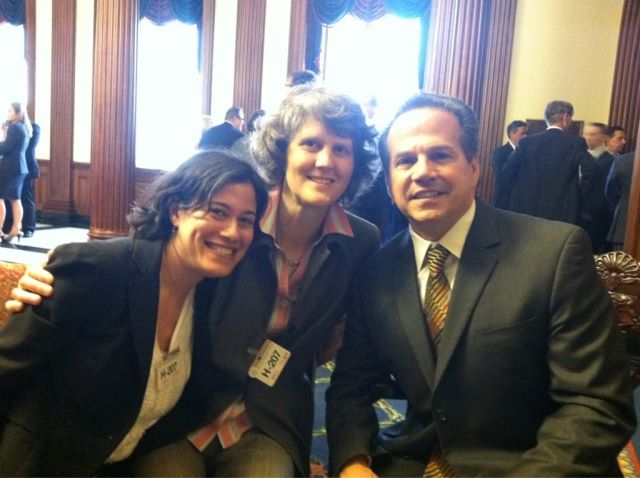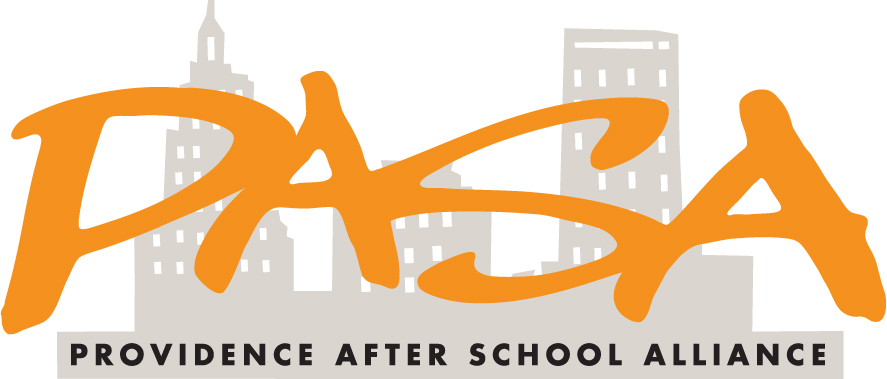

From left to right: Collaborative for Building After School Systems (CBASS) Director Jessica Donner, PASA Executive Director Hillary Salmons, and Congressman David Cicilline on Capitol Hill.
Posted on May 6, 2013 by Jessica Donner
CBASS is not letting the stalled reauthorization of the Elementary and Secondary Education Act (ESEA) keep us from pressing our policy priorities in DC. Two weeks ago, we met with local delegates and staff from the Senate and House education authorization and appropriations committees to discuss our policy recommendations. As much as policy change in DC may be gridlocked, we left the Hill inspired by staffers’ hunger to understand from education leaders what works and what doesn’t, and how our on-the-ground work can inform legislation.
Here’s what we discussed:
Maintain the stand-alone 21st Century Community Learning Center program.
We continue to be dismayed by House Education leaders’ partisan approach to reauthorization and insistence on block granting discretionary education funds, such as the 21st Century Community Learning Center (CCLC) program. We continue to fight for a stand-alone funding stream to ensure these critical resources are available to communities in need. President Obama’s proposed $100 million increase to the 21st CCLC is a promising step in the right direction to ensure that more kids from high-need communities have opportunities to thrive and learn beyond the traditional school day.
Ensure strong partnerships between schools and community partners are required for all 21st CCLC programs.
In a scan of just our CBASS communities, we learned that partnerships are often prioritized in state policy, but not required. We believe all communities, both urban and rural, have the ability to transform learning experiences by leveraging the combined power of school and community partnerships. We shared with staff our stories of how intermediary organizations like the Nashville After Zone Alliance brings community partners like the YMCA and Girls, Inc. into the schools to deliver inspiring programming. Programs like this have doubled the participation rate in after-school and broken new ground with the school district in creating mechanisms for sharing information around school attendance and other academic outcomes.
Encourage participation of intermediaries to help leverage resources, increase efficiencies, and promote sustainability.
Policy makers are extremely receptive to learning about the impact of intermediary organizations, particularly how we improve program quality, maximize community resources, and target high-quality services to kids in high-need communities. Underscoring this recognition of the value of intermediary organizations, in 2012 the Senate Appropriations Committee recommended that the U.S. Department of Education use local and statewide intermediaries to provide technical assistance on developing strong school and community partners. We shared new research on TASC’s leadership in designing a national ExpandED Schools model, which has led to gains in math performance, school attendance and school climate. TASC has also led efforts to help schools and community organizations cover program costs by braiding a variety of funding resources.
21st CCLC funds should not be used for the redesign of the school day.
Standing language from the 2011 Senate Health, Education, Labor, and Pensions Committee ESEA bill allows the use of 21st CCLC funds for redesign of the school day. CBASS released a memo expressing concerns about allowing the use of these relatively modest funds for administrative costs involved in comprehensive school redesign, as compared to Title I or other monies. Funds from the 21st CCLC program should continue to be used predominantly for direct services for programs that expand opportunities for students from low-income communities. As our partner, Jennifer Peck, recently explained in the Huffington Post, “While a redesign of the school day for all students is well worth exploration, funding should be pulled from multiple federal funding streams” for whole school redesign models.
Read our full list of policy principles.
Jessica Donner is Director of the Collaborative for Building After-School Systems (CBASS). This post originally appeared on Expanded Learning Perspectives, the CBASS blog.
